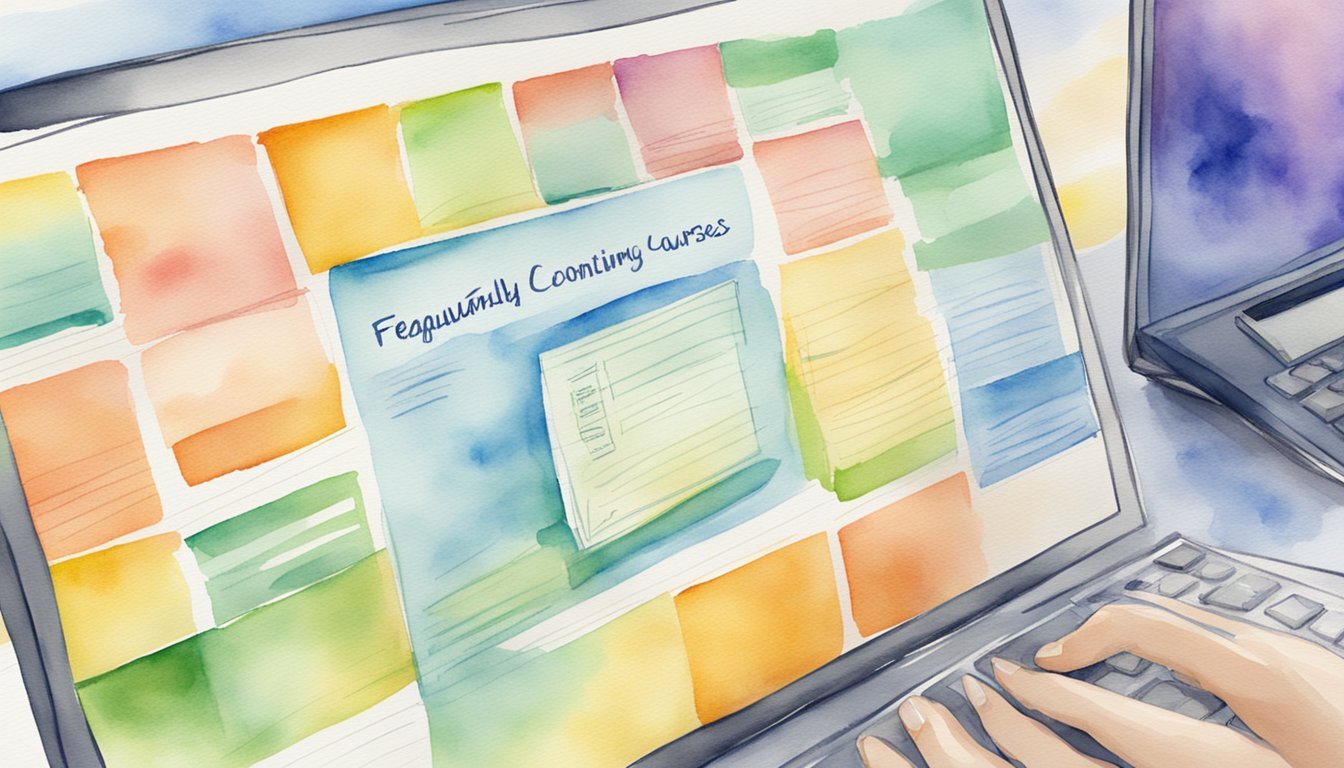10 Online Continuing Education Courses for Teachers: Enhance Your Skills This Summer

Online courses offer teachers a great way to keep learning and growing in their careers.
You can take these classes from home and often at your own pace.
They let you learn new skills, stay up-to-date with teaching methods, and move up in your job.

Continuing education courses for teachers can help you earn credits for salary raises or keep your teaching license current. Many schools now offer online options, making it easier to fit learning into your busy life.
These courses cover a wide range of topics to help you become a better teacher and advance in your field.
1) Classroom Management Strategies
Teachers can boost their skills with online classroom management courses.
These classes help you create a positive learning environment.
You’ll learn how to set clear rules and expectations.
This helps students understand what you want from them.
It also makes your job easier.
Good classroom management includes effective communication.
You’ll discover ways to talk with students that encourage good behavior.
Many courses teach how to handle disruptions.
You’ll gain tools to deal with challenging situations calmly and fairly.
Time management is another key topic.
You’ll find out how to make the most of your class time and keep students engaged.
Some courses focus on positive reinforcement.
You’ll learn ways to reward good behavior and motivate students.
Technology can help with classroom management too.
You’ll explore digital tools that can track behavior and streamline your processes.
Building strong relationships with students is crucial.
These courses show you how to connect with your class while maintaining authority.
You’ll also learn about different management styles.
This lets you find an approach that fits your teaching style and personality.
Remember, good classroom management leads to better learning.
These courses give you the skills to create a productive classroom where students can thrive.
2) Teachers First Webinars

Teachers First offers free online professional development through their OK2Ask® program.
You can access a variety of virtual workshops designed to enhance your teaching skills.
These webinars focus on applying research-based teaching methods.
You’ll find plenty of practical ideas to use in your classroom right away.
OK2Ask® provides two formats for your convenience.
You can join live sessions to earn professional development credit.
If timing is an issue, you can watch on-demand recordings without credit.
The best part? These webinars are completely free for teachers.
You can expand your knowledge and improve your teaching techniques without spending a dime.
TeachersFirst encourages active participation during their webinars.
You’ll have chances to engage with presenters and other educators.
This interaction helps you get the most out of each session.
Topics cover a wide range of educational interests.
You might learn about new technology tools, classroom management strategies, or subject-specific teaching methods.
By participating in these webinars, you can stay up-to-date with current educational trends.
This ongoing learning can help you become a more effective teacher.
3) EdTech Integration for Educators

EdTech integration has become a key skill for modern teachers.
You can boost your classroom tech skills with EdTech Integration Training courses.
These programs help you learn how to use new tools effectively.
You’ll discover ways to blend technology into your lessons smoothly.
This includes working with interactive whiteboards, tablets, and even 3D printers.
The goal is to make your teaching more engaging and effective.
Many courses focus on practical skills you can use right away.
You’ll learn about online tools for digital teaching and learning.
These skills can help you create more dynamic lessons that grab students’ attention.
Some programs offer hands-on practice with popular classroom tech.
You might explore how to use educational apps or create digital content for your students.
This helps you feel more confident using technology in your daily teaching.
EdTech courses often cover ways to promote digital literacy among students.
You’ll learn strategies to help kids use technology responsibly and effectively.
This is a crucial skill in today’s digital world.
Many online platforms offer EdTech courses for teachers.
These let you learn at your own pace from home.
You can often earn credits towards your professional development requirements too.
By taking EdTech integration courses, you’ll be better prepared to meet the needs of today’s tech-savvy students.
You’ll also gain valuable skills that can enhance your teaching career.
4) Inclusive Teaching Practices
Inclusive teaching helps all students feel welcome and supported in the classroom.
You can learn these skills through online courses designed for educators.
Many universities offer free online courses on inclusive teaching.
These courses teach you how to create a learning environment where all students can succeed.
Free online courses are available to help you improve your inclusive teaching skills.
They cover topics like equity in remote and hybrid learning settings.
These courses usually take 8-10 hours to complete.
You can often earn continuing education credits for finishing them.
In these courses, you’ll learn about practices that support diversity and inclusion.
You’ll discover ways to make your teaching more accessible to all students.
The courses focus on practical skills you can use right away in your classroom.
They teach you how to create a sense of belonging for all students.
You’ll also learn how to ensure all students can access course materials easily.
This is especially important in online and hybrid learning environments.
By taking these courses, you can help create a classroom that reflects and supports the diverse world we live in.
This benefits all of your students and improves their learning experience.
5) Effective Communication with Parents
Good communication with parents is key for teachers.
You can learn how to do this better through online courses.
These courses teach you ways to talk with parents that work well.
One important skill is opening reliable channels of communication.
You’ll learn how to find out how each parent likes to be contacted.
Some may want face-to-face talks, while others prefer calls or emails.
You can also learn about positive listening and speaking skills.
These help you understand parents better and explain things clearly.
Courses cover how to overcome communication barriers too.
Many courses teach you how to make parents feel like partners in their child’s education.
You’ll discover ways to keep them involved and informed about what’s happening at school.
You can find courses that focus on building positive relationships with families.
These show you how to create trust and work together with parents.
Some courses cover how to handle tough talks with parents.
You’ll learn tips for staying calm and finding solutions when problems come up.
By taking these courses, you can become more confident in your parent communication skills.
This can lead to better teamwork between you and your students’ families.
6) Developing Curriculum in the Digital Age
The digital age has transformed how teachers create and deliver lessons.
You can now access tools and resources to build engaging online curricula for your students.
Online curriculum development courses offer valuable skills for modern educators.
These programs teach you how to design effective digital learning experiences.
You’ll learn to use multimedia elements like videos, interactive quizzes, and virtual simulations.
These components can make your lessons more dynamic and appealing to students.
Course topics often include instructional design principles for online environments.
You’ll discover how to structure content for optimal learning in digital formats.
Many programs also cover assessment strategies for online learning.
You’ll gain techniques to measure student progress and understanding in virtual settings.
Collaboration tools are another key focus.
You’ll explore ways to foster student interaction and group work in digital classrooms.
These courses typically emphasize accessibility and inclusivity in online curriculum design.
You’ll learn to create content that meets diverse learning needs.
By taking an online curriculum development course, you’ll enhance your ability to teach effectively in today’s tech-driven educational landscape.
7) Differentiated Instruction Techniques

Teachers can boost their skills with online courses on differentiated instruction.
These courses teach you how to meet the needs of diverse learners in your classroom.
You’ll learn about interest centers, a key strategy in differentiated instruction.
These centers allow students to explore topics that excite them, making learning more engaging.
Flexible grouping is another important technique you’ll study.
This approach lets you group students based on their skills, interests, or learning styles for different activities.
Cubing and tiering are two more strategies covered in these courses.
Cubing involves looking at a topic from six different angles, while tiering adjusts the complexity of tasks to match student readiness.
These courses often include real-world examples and sample lessons.
You can apply these ideas in your classroom right away to improve learning outcomes.
By taking an online course in differentiated instruction, you’ll gain practical tools to help all your students succeed.
You’ll be better equipped to address the unique needs of each learner in your diverse classroom.
8) Social-Emotional Learning
Social-emotional learning (SEL) is a crucial area for teachers to master.
It helps you create a positive classroom environment and support your students’ overall development.
You can find several online courses focused on SEL.
These programs teach you how to foster important skills in your students, like self-awareness and responsible decision-making.
Penn GSE offers a certificate program in Teaching and Leading Social-Emotional Learning.
This course is great for educators who want to deepen their understanding of equity-oriented SEL.
Coursera provides a specialization called “The Teacher and Social and Emotional Learning (SEL)”.
It covers the five key competencies of SEL programs.
You can also find SEL courses on Teaching Channel.
These classes help you explore strategies to meet each child’s needs beyond academics.
Some programs, like the certificate in social and emotional learning, focus on specific skills.
You’ll learn about self-management, social awareness, and relationship skills.
By taking these courses, you’ll gain valuable tools to support your students’ emotional growth.
You’ll also learn how to create a more inclusive and supportive classroom environment.
9) Boosting Student Engagement
Keeping students engaged in online courses can be tricky.
You can use active learning strategies to boost engagement in your virtual classroom.
These methods help capture students’ attention and make learning more interactive.
One effective approach is to reach out to students before the course starts.
Send a welcome email introducing yourself and providing key information.
This sets a positive tone and shows your commitment to their success.
Try incorporating TED Talks into your lessons.
These presentations can inspire new ideas and spark interesting discussions.
They’re a great way to introduce complex topics in an engaging format.
Consider using different types of engagement in your online courses.
Focus on behavioral, emotional, and cognitive aspects to create a well-rounded learning experience.
This approach helps address various engagement challenges.
Make use of interactive tools and platforms.
Discussion boards, live chats, and collaborative projects can foster a sense of community.
These elements encourage students to participate actively and learn from each other.
Remember to provide regular feedback and support.
Stay in touch with your students throughout the course.
Offer guidance, answer questions, and recognize their efforts.
This ongoing communication helps maintain motivation and engagement.
10) Assessment and Evaluation Methods
Teachers need to stay up-to-date on the latest assessment and evaluation techniques.
Online courses can help you improve your skills in this area.
Formative assessment is a key topic in many courses.
You’ll learn about different ways to check student understanding during lessons.
Some courses focus on online assessment strategies.
These are helpful if you teach virtual classes or use digital tools in your classroom.
You might explore courses on creating effective rubrics.
These tools can make grading more consistent and fair.
Data analysis is another important skill.
Courses can teach you how to use test results to improve your teaching.
Some programs cover both formative and summative assessments.
You’ll learn when to use each type and how they support student growth.
Technology often plays a big role in modern assessment.
Courses can show you how to use digital tools for quizzes and tests.
You might also learn about alternative assessment methods.
These include projects, presentations, and portfolios.
Courses can help you align your assessments with learning goals.
This ensures you’re testing what you actually taught.
By taking online courses, you can expand your assessment toolkit.
This helps you better measure and support student learning.
Importance of Continuing Education for Teachers
Continuing education helps teachers grow professionally and adapt to changing educational needs.
It offers ways to improve classroom skills, learn about new trends, and advance careers.
Enhancing Teaching Skills
Continuing education for teachers can boost your classroom effectiveness.
You’ll learn new teaching methods and strategies to engage students better.
These courses often focus on practical skills you can use right away.
For example, you might learn how to:
- Use technology in lessons
- Manage classroom behavior
- Teach diverse learners
By improving your skills, you can create a more positive learning environment.
Your students may show better academic results and increased engagement.
Staying Updated with Educational Trends
Education is always changing.
New research, technologies, and policies affect how you teach.
Continuing education courses keep you informed about these changes.
You’ll learn about:
- Latest teaching theories
- New educational technologies
- Changes in curriculum standards
This knowledge helps you adapt your teaching methods.
You can incorporate new ideas that benefit your students.
Career Advancement Opportunities
Ongoing learning can open doors in your teaching career.
Many schools value teachers who pursue professional development.
Continuing education can lead to:
- Higher salaries
- Leadership roles
- New teaching specialties
You might qualify for roles like department head or curriculum specialist.
Some teachers move into administration or teacher training.
Continuous learning shows your commitment to education.
It can make you a stronger candidate for promotions and new positions.
Accreditation and Credits
Accreditation and credits play a crucial role in online continuing education for teachers.
They ensure the quality and recognition of courses, helping educators advance their careers.
Understanding CEU (Continuing Education Units)
CEUs are a standard measure of participation in professional development activities.
One CEU typically equals 10 hours of instruction.
These units help track your progress and show your commitment to ongoing learning.
CEUs are often required for license renewal or career advancement.
Different states and districts may have specific CEU requirements.
It’s important to check with your local education board for exact details.
Some courses offer both CEUs and graduate credits.
Graduate credits can often be applied towards advanced degrees, while CEUs are mainly for professional development.
How to Verify Course Accreditation
Before enrolling in any online course, it’s crucial to verify its accreditation.
Start by checking the course provider’s website for information about their accrediting bodies.
Look for recognition from respected educational organizations.
These might include regional accreditation agencies or professional teaching associations.
You can also contact your state’s department of education.
They can confirm if a course meets your state’s requirements for professional development or license renewal.
Don’t hesitate to ask the course provider directly about their accreditation. Reputable providers will be transparent about their credentials and partnerships with accredited universities.
Importance of Accredited Certifications
Accredited certifications carry more weight in your professional development.
They are recognized by employers and educational institutions as valid proof of your skills and knowledge.
These certifications can lead to salary advancements and new job opportunities.
Many school districts offer pay increases for teachers who complete accredited courses.
Accredited courses often provide more in-depth, high-quality content.
They are designed to meet specific educational standards and learning outcomes.
By choosing accredited courses, you ensure that your time and money are well-spent.
You gain valuable skills that are relevant to your teaching practice and recognized by your peers and employers.
Choosing the Right Online Course
Picking the best online course takes some thought.
You’ll want to look at a few key things to make sure you get the most out of your time and money.
Assessing Course Quality
Check the course content and structure.
Look for clear learning goals and a well-planned outline.
Good courses have a mix of videos, readings, and hands-on tasks.
See if the course is up-to-date and relevant.
Teaching methods change fast, so you want fresh info.
Look at who’s teaching.
Are they experts? Do they have real classroom experience? This can make a big difference in what you learn.
Make sure the course fits your schedule.
Can you work at your own pace? Are there set deadlines? Pick something that works for your life.
Balancing Cost and Benefits
Compare prices of different courses.
Cheaper isn’t always better, but pricey doesn’t always mean top quality.
Think about what you’ll gain.
Will it help you move up in pay? Can you use it for recertification?
Look for courses that give you tools you can use right away in class.
Quick wins make the cost more worth it.
Check if your school helps pay for courses.
Some offer money for teacher training.
This can make good courses more affordable.
Reading Reviews and Testimonials
Look for reviews from other teachers.
They can tell you if the course is really helpful.
Check if the course has ratings or stars.
High scores often mean happy students.
Read what people say about using the course info in real classes.
This shows if it’s practical.
Be careful of reviews that sound too perfect.
Real feedback usually has some pros and cons.
Look for comments about customer service.
Good support can make a big difference if you have questions.
Frequently Asked Questions

Teachers have many options for online continuing education.
These courses can help with professional growth, certification, and career advancement.
What are the best free online continuing education courses for teachers?
Alison offers free online courses on topics like educational psychology and school management.
These courses can expand your knowledge without cost.
Teachers First Webinars provide free professional development sessions on various teaching topics.
Where can teachers find online professional development courses with certificates at no cost?
Many educational websites offer free courses with completion certificates.
Look for platforms that specialize in teacher training and development.
Check with your school district or state education department.
They may offer free online courses that provide certificates.
How can teachers earn graduate credits affordably through online courses?
Online continuing education courses can often be applied towards graduate credits.
These are usually more affordable than traditional university courses.
Look for accredited programs that partner with universities to offer graduate-level credits at reduced rates.
Which professional development courses offer salary advancement for teachers?
Courses on EdTech integration and inclusive teaching practices often qualify for salary advancement.
Check with your school district for approved course lists.
Professional credentials typically require periodic renewal through continuing education.
These courses can lead to salary increases.
What type of continuing education units (CEUs) are available through online courses?
CEUs are available in various subjects including classroom management and effective communication with parents.
Some courses offer specific CEUs for license renewal or professional development hours required by your state or district.
How can teachers improve their online teaching skills through professional development courses?
Courses on EdTech integration can help you learn new tools and techniques for online teaching.
Look for courses that focus on virtual classroom management and engaging students in remote learning environments.

